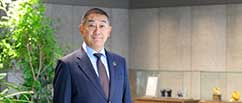Interview with the CFO

By allocating capital appropriately from
the perspectives of financial soundness,
growth investment, and shareholder
returns, we aim to enhance corporate
value over the medium to long term.
Masanori Nishioka
Representative Director & Senior Executive Corporate Officer
CFO
Please tell us your basic approach to investment.
Also, you are actively investing to establish a foundation,
in keeping with the current Medium-Term
Business Plan. What are your investment plans
during the period of the plan?
At the Hakuhodo DY Group, we view investments as strategic expenses for strengthening our business foundation, including the expansion of human resources well-versed in digital and other technologies. We also view investments such as mergers and acquisitions (M&A) as actions that directly impact the balance sheets.
Strategic expenses are geared toward realizing organic growth over the medium to long term. In a sense, they function as the seeds, fertile soil, and water needed for growing our business.
With the rapid progression of digitalization, it is crucial that we secure personnel who can implement digital marketing activities. It is also imperative that we increase the number of personnel well-versed in technologies to cultivate a foundation for future growth. Being able to respond to technologies such as ChatGPT and other forms of artificial intelligence (AI) and extended reality (XR) is key.
Furthermore, as we work to transform our business structure, we must reform our workstyles and establish a sustainable operating structure. Although this will push costs into the present, the expenses we are currently investing in will serve as a bedrock for future growth.
Now is the time for us to build a foundation, and we are making substantial upfront investments to do so. As a result, profit growth will be slower than usual during the period of the Medium-Term Business Plan, which runs through to the end of fiscal 2023.
The Group's business requires no significant capital investments; our principal assets are creative people. For this reason, the essence of our financial discipline is to fund investment and shareholder returns out of cash flows generated by our operating activities.
Explaining capital allocation under the current plan on that basis, assuming we meet the targets outlined in our Medium-Term Business Plan for fiscal 2023, total earnings before interest, taxes, depreciation, and amortization (EBITDA) during the three years from fiscal 2021 will come to approximately ¥250.0 billion. Furthermore, if we assume that corporate income tax and dividend payments remain at the same level as in fiscal 2022, even taking into account buyback of our shares between November 2022 and May 2023, we should produce around ¥100.0 billion in cash over the three-year period. We are investing within this scope.
This investment will go mainly toward tangible and intangible assets and into mergers and acquisitions (M&A).
Over the past two years, we have spent a total of about ¥28.0 billion on tangible and intangible assets. We continue to invest in technology and in revising our offices to improve productivity. In fiscal 2023, we expect to keep spending at approximately the same level as in the two years previously.
We have undertaken numerous small and medium-sized M&A, and in fiscal 2021 we acquired SoldOut,Inc., through a tender offer. Although at this point we cannot state clearly how much we will invest in fiscal 2023, we plan to continue aggressively strengthening our capabilities through M&A and capital alliances.
Actually, our net cash will increase, owing to sales of investment securities and other Group assets, and due to revisions we made to the Medium-Term Business Plan. While we recognize the need to invest in technology and globalization over the medium to long term, we believe we should have ample room to invest while remaining financially sound.
Please tell us what you can about investment under the next medium-term business plan, which is currently being formulated.
The next medium-term business plan, which will begin in fiscal 2024, is currently under consideration. That said, regardless of the plan's details I can share our conviction that the Group needs to engage in M&A and enter capital alliances in order to acquire the outside functions and capabilities it needs to grow more quickly.
This is particularly the case in global business domains. The overseas business domain has just exceeded 25% of consolidated gross profit. We believe M&A is needed to strengthen this business further.
In Japan, we are considering M&A as a way to enhance our capabilities in response to business expansion in the digital and marketing execution domains. We also believe that capital alliances are an effective way to reinforce ourselves on the technology front.
It is important to note that M&A is not simply a tool for growing our scale of business. The objective is to complement the Group's offerings in areas where we are lacking, to seek synergies, and to improve our efficiency.
You mentioned capital allocation. What are your thoughts on the Group's cash position?
Looking at our business cycle, we like to maintain a balance of cash and cash equivalents totaling around one month's worth of billings. On average, we record billings of at least ¥100.0 billion a month, so we intend to raise funds with an awareness of that level.
At the end of fiscal 2022, cash and time deposits stood at ¥162.9 billion, and interest-bearing debt was ¥124.2 billion, resulting in net cash of ¥38.7 billion.
Net cash stood at ¥62.8 billion at the end of fiscal 2020, just before we revised our Medium-Term Business Plan. As I mentioned earlier, our basic policy is to balance income and expenditures during the period of the plan, including strategic investments and M&A. We believe we can remain financially sound even if there are slight deviations between the planned and actual timing of income and expenditures.
Earlier, I talked about setting aside an investment "budget." Because of the timing of investments, investment amounts will undoubtedly exceed cash flows from operating activities in the short term. In such cases, we use external financing, but we aim to achieve equilibrium over the medium to long term. Said differently, we intend to maintain our medium-term net cash position.

What is your approach to financing under your policy of maintaining net cash over the medium term?
Interest-bearing debt of ¥100.0 billion remains from when we turned D.A.Consortium Inc. (DAC) into a wholly owned subsidiary in 2018. In terms of fundraising, we will make relevant decisions while considering our cash level as well as our investment plans. The financial market is undergoing significant changes, and we understand that we must diversify our fundraising activities as a result. Going forward, we will consider the most appropriate funding method given the market environment.
We received an A+ rating from Rating and Investment Information, Inc. (R&I) in September 2022, and we have sustained that rating fiscal 2023. We understand that R&I evaluates our financial condition as stable, and we will strive to maintain the same level of financial soundness in the future.
In recent years, "management that is conscious of cost of capital" is being identified as necessary to sustain corporate growth and enhance corporate value over the medium to long term.
In March 2023, we received requests from the Tokyo Stock Exchange regarding "action to implement management that is conscious of cost of capital and stock price" and "better dialogue with shareholders and related disclosure." On the first topic, we understand that attention is focusing on "a price book-value ratio (PBR) falling below 1.0." Fortunately, as of the end of March 2023, our PBR is above 1.0. Simply exceeding this level is not sufficient, however. We also need to continuously improve investment and capital efficiency, engage in appropriate dialogue with investors, and meet investors' expectations.
When it comes to investments, we naturally consider corresponding effects and profitability. Our basic principle is to seek returns that exceed the cost of capital. Currently, we recognize the cost of capital for the Group to be around 8%, and we keep this in mind when setting hurdle rates for our major businesses. Moving forward, we will continue working to achieve capital returns that exceed the cost of capital and striving for sustainable growth.
With regard to capital efficiency, the capital markets have suggested that our cross-shareholdings are too high. At the end of fiscal 2022, investment securities came to ¥132.7 billion. Not all of this amount constitutes cross-shareholdings, as it includes shares held in affiliates. However, the total of "special investment shares" disclosed in our fiscal 2022 annual report was ¥91.1 billion. I believe that the reason some investors have this perception is because this amount represents 23% of our equity.
Every year, we review the purpose and economic impact of our cross-shareholdings and gradually sell off those shares that we have no logical reason to retain. We understand that we are in an era in which there are strong demands for companies to reduce their cross-shareholdings, and we therefore intend to sell off our cross-shareholdings in a manner that does not inconvenience the investee companies, thereby enhancing our capital efficiency.
Actually, over the past five years, we have sold off a total of ¥75.0 billion in investment securities. I ask that our investors understand our approach to addressing this matter.

Note: Income from sales of investment securities on the consolidated statements of cash flows
Please tell us your approach to shareholder returns.
Our basic policy is to provide stable dividend payments based on our desire to offer long-term economic benefits to our shareholders.
Even with the temporary decline in profits amid the COVID-19 pandemic, we have continued to maintain and increase our dividend levels. Although we forecast a decline in net income in fiscal 2023, we intend to leave our dividend levels unchanged.
We also consider buyback of shares as an additional means of providing shareholder returns and improving capital efficiency. Taking into account such factors such as performance, funding requirements, our financial condition, and stock price trends, in November 2022 we resolved to buy back up to ¥10.0 billion worth of our own shares.
Since announcing the buyback, we have received a growing number of inquiries from stakeholders asking if our shareholder return policy has changed. We want to clarify that our fundamental approach to shareholder returns, with dividends as the foundation and buyback of shares serving as an ancillary measure, remains unchanged.
However, we acknowledge that it may be difficult for stakeholders to understand some aspects of our shareholder return policy, such as exactly how dividend stability is achieved. Therefore, in addition to capital allocation and capital efficiency, we plan to deliberate this topic in more detail and address this concern as we look to our next medium-term business plan.

∗ Note: The figure for fiscal 2023 indicates the number of shares issued as of June 30, 2023 minus the number of shares of treasury stock times the dividend forecast announced on May 11, 2023 (¥32 per share).
In closing, from your position as CFO, is there anything you would like to convey to readers?

Fiscal 2023 is the final year of our current Medium-Term Business Plan, and there are limitations to what can be disclosed regarding the next plan. However, as the CFO, it is my role to analyze various aspects of the Group, such as stakeholders' expectations and growth opportunities, and determine appropriate capital allocation from the perspectives of financial soundness, growth investment, and shareholder returns, in the interest of enhancing corporate value over the medium to long term. I ask for the continued support and encouragement of all our stakeholders as we strive toward this goal.




